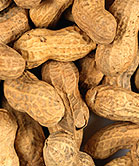- Recognizing the Signs of Hypothyroidism
- 10 Strategies to Overcome Insomnia
- Could Artificial Sweeteners Be Aging the Brain Faster?
- Techniques for Soothing Your Nervous System
- Does the Water in Your House Smell Funny? Here’s Why
- Can a Daily Dose of Apple Cider Vinegar Actually Aid Weight Loss?
- 6 Health Beverages That Can Actually Spike Your Blood Sugar
- Treatment Options for Social Anxiety Disorder
- Understanding the Connection Between Anxiety and Depression
- How Daily Prunes Can Influence Cholesterol and Inflammation
Did Bone Marrow Transplant Cure Peanut Allergy?


FRIDAY, Nov. 8Bone marrow transplants may help cure peanut allergies, a new case study suggests.
The study involved a 10-year-old boy who no longer had a peanut allergy after undergoing a bone marrow transplant for leukemia.
“It has been reported that bone marrow and liver transplants can transfer peanut allergy from donor to recipient,” study author Dr. Yong Luo said in a news release from the American College of Allergy, Asthma and Immunology (ACAAI). “But our research found a rare case in which a transplant seems to have cured the recipient of their allergy.”
The case involved a boy who was diagnosed with a peanut allergy when he was 15 months old. He had the bone marrow transplant at age 10 and received his new marrow from a donor with no known allergies.
Soon after the transplant, it appeared that the boy no longer had a peanut allergy. That discovery was confirmed by allergists through an oral food challenge, in which the boy ate a small amount of peanut and showed no allergic reaction.
The research was scheduled for presentation this week at the ACAAI annual meeting in Baltimore. Research presented at medical meetings should be viewed as preliminary until published in a peer-reviewed journal.
Study co-author Dr. Steven Weiss said this and previous research indicates that “genetic modification during the early stages of immune cell development in bone marrow may play a large role in causing allergy.”
Peanut allergy is the most common food allergy among school-aged children in the United States, affecting about 400,000 youngsters, according to the ACAAI. Unlike milk or soy allergies, peanut allergies tend to last a lifetime.
Even if a parent thinks their child may no longer have an allergy, proper testing should be done to confirm if the child is still sensitive to any particular allergens, according to the ACAAI.
More information
The U.S. National Institute of Allergy and Infectious Diseases has more about food allergies.
Source: HealthDay
Copyright © 2026 HealthDay. All rights reserved.










